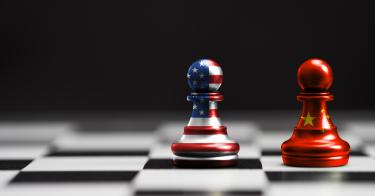This month, Colombia announced it has officially joined the Belt and Road Initiative (BRI), an international development institution backed by the Chinese Communist Party. The initiative was designed with the intent to increase China’s global monetary influence through strategic infrastructure investments. This unfortunate news comes just months after Panama made the impressive decision to become the first country leave the BRI.
That Colombia, an American ally, would accept support from a U.S. adversary, points to a fundamental issue: the U.S. is not effectively countering China’s economic warfare.
Therefore, to protect our allies across the globe, Washington must commit to the shift from ineffective grant-based USAID to the America First aligned Development Finance Corporation.
Appealing to Colombia’s underutilized Pacific coast and a $14 billion trade deficit, Xi Jinping was able to convince Colombia’s Marxist President Gustavo Petro to sign a deal promising a commercial trade route from Shanghai to Puerto Buenaventura.
>>> The New Cold War With China
Colombia has long been one of America’s closest allies in the Western Hemisphere and the two have a strong and effective partnership. After decades of conservative leadership in Bogota, resulting in a more prosperous and secure Colombia, it is a shame Colombia’s leftist leader is opting to accept CCP funds.
But these instances are, unfortunately, not unique to Colombia. Developing nations cannot help but accept billion dollar offers by the CCP, especially when some politicians are paid to pursue dangerous BRI deals.
As if that weren’t enough, The Lowy Institute points out that Beijing has turned into a “net financial drain on developing country budgets as debt servicing costs on Belt and Road Initiative projects from the 2010s now far outstrip new loan disbursements.”
Moreover, the BRI will collect $35 billion in debt this year from some of the most economically disadvantaged nations.
This is coercion at its finest.
The BRI, established in 2013, responded to the developing world’s need for roads, railways, ports and other key infrastructure that USAID and other Western donors were not keen to finance. Quickly, the BRI posed a threat to the security of the U.S. and its allies, as Beijing leveraged the inability of poor countries to pay back these loans into military and political assets.
Meanwhile, USAID’s mission was corrupted by politicized left-wing initiatives and detached from any free market economic reforms that would prompt wealth creation and wean poor countries off aid dependency, leaving our global partners no other option for infrastructure development.
“What should be an effective tool of U.S. foreign policy,” Heritage Foundation Senior Research Fellow Max Primorac testified in February before the House Foreign Affairs Committee, “has turned into a highly partisan global vehicle focused on spending ever higher amounts of money instead of achieving concrete outcomes consistent with American interests.”
Worse, taxpayer dollars were used to finance blatantly ideological social agendas within USAID. In fact, Secretary Rubio recently pointed out that only 12 cents to every dollar were directed to real aid.
All along, China’s economy has grown to two-thirds the size of America’s—a level of economic competition the U.S. never faced from Russia during the Cold War. And the BRI only further accelerates China's economic trajectory. In fact, the BRI is could even boost Chinese GDP by an additional $7.1 trillion by 2040.
Allowing Beijing to continue expanding its economic influence while simultaneously courting critical U.S. allies like Colombia presents a clear and substantial strategic threat to American security and global interests.
For these reasons, America should immediately offer a financial alternative to the world.
The dismantling of USAID offers the U.S. government an opportunity to transition from its ineffective grants-based aid approach towards one that promotes trade and investment tied to American interests and values.
In close coordination with and following the political direction of Secretary Rubio’s State Department, the U.S. Development Finance Corporation (DFC) has the potential to play that role.
>>> Trump Must Protect American AI From China
Established in 2019 through the BUILD Act, the DFC seeks to “advance U.S. foreign policy and strengthen national security by mobilizing private capital around the world.” Today, the institution partners with the private sector to mobilize capital for high-impact development initiatives around the world, ensuring significant and sustained impact.
Recent examples underscore this potential: the DFCs expansion of natural gas processing capacity in Iraq and strengthening of critical mineral supply chains in Angola demonstrate the agency’s ability to generate lasting results where USAID fell short.
Through its investment campaigns and debt financing opportunities, the DFC is not only a viable alternative to the CCP’s BRI for developing nations, but also a method through which the U.S. can assure mutually beneficial opportunities abroad.
And fortunately, it abides by international labor and environmental standards in contrast to Chinese companies known for corrupting foreign officials to win contracts.
In crude terms, USAID was meant to use money as a powerful tool of statecraft. They failed, and BRI stepped in.
However, Washington must understand that USAID’s shortcomings do not invalidate the broader value of economic engagement.
Currently, Congress is preparing to extend and strengthen the Build Act and provide DFC with additional resources. This is a critical step to ensure the security and prosperity of allies and partners like Colombia while effectively countering China’s growing malign influence.
This piece originally appeared in RealClear World



